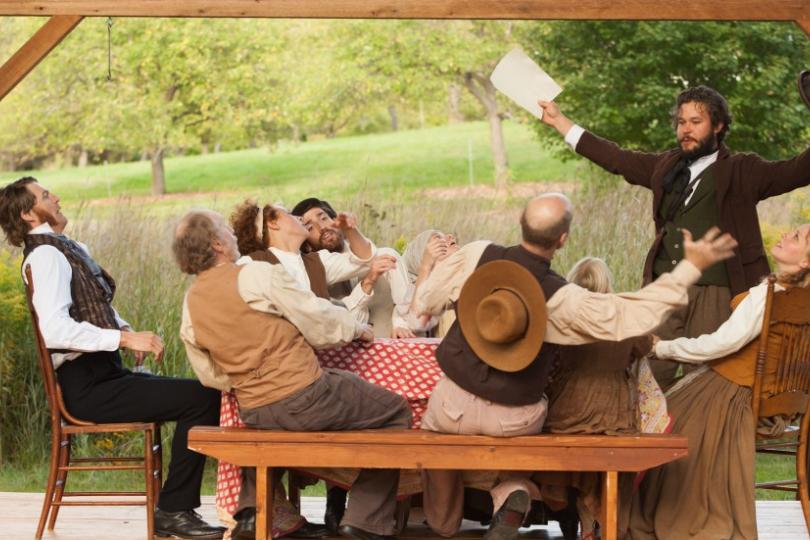Nature is transcendent

When I was in high school in the early 1990s, there were two ways for literary-minded students to express their ambitions toward precociousness. The first was by reading the first third—or even half!—of Atlas Shrugged and accepting the wisdom of Ayn Rand, smug in the knowledge that one’s teenage nastiness was, in reality, the highest manifestation of the free market’s exquisite wisdom.
The second was by reading a couple of excerpts of essays by Ralph Waldo Emerson and Henry David Thoreau and declaring oneself an adherent of Transcendentalism, a philosophy that in skillful adolescent hands can explain why it is morally permissible to shoplift cigarettes, a jar of blue Manic Panic and a CD of Holy Smoke.
I fell into the transcendentalist camp, naturally. Which is to say that I, like most Americans, happily abused America’s intellectual and political heritage to justify things I had already decided to do.
Anyone who in good faith tries to correct the public record on transcendentalism, Emerson and Thoreau, therefore, has my support. And, through October 12,TigerLion Arts is doing just that with Nature: A Walking Play.
They have my support.
19th century tradition in the 21st century
Nature is a surprisingly movement- and music-infused, abstract portrait of Emerson and Thoreau’s friendship and, to a lesser degree, their work as philosophers. Performed at a handful of locations at the Minnesota Landscape Arboretum (the audience really does walk), Nature is more than a standard-issue historical or biographical piece. It has potential to be a 21st-century inheritor of the 1800s’Chautauqua movement, a fusion of public education and entertainment, created to move the American people toward a more rational, democratic ideal. (The producers are planning on a national tour, performing Nature in outdoor, public spaces.) It’s an idea rooted in the very best republican traditions—-traditions America has been slowly suffocating since about 1965.
The show owes much of its energy to its performance outdoors, and director Markell Kiefer does an admirable job creating performance spaces that are clearly demarcated from but wholly integrated into some rather majestic landscapes. Some of the moments are strikingly beautiful, and there always will be something to venerate in hearing, as we do here, delicate music sung by strong voices echoing off a hill of tall prairie grass. Composer Dick Hensold has done a terrific job with a score inspired by the music of New England in the 19th century.
In these moments, the cast reaches a transcendentalist image of human harmony with nature. Too often, humans either try to dominate nature or feel irrelevant within it. Both attitudes reinforce the notion that people are apart from everything, living on the margins of the natural world. But nature has no margins. The best parts of Nature are reminders of how we are happily but inextricably bound to the world.
It’s a rare sensation, but one that can spark a spirit of civic and ecological responsibility. It’s an admirable thing for artists acting as educators to draw out of an audience.
Musical, poetic, stylized
Both the script—-written by Kiefer along with Tyson Forbes and Sam Elmore—-and the delivery are deeply musical and poetic. Seldom does anyone have a natural conversation; everything is designed, directed and deliberate. The verbal mosaic engages best when it’s focused on the men’s friendship. Forbes as Emerson, John Catron as Thoreau, and Lauren Asheim as Emerson’s wife, Lidian, all play their roles with equal parts industrial-strength boldness and nuance, an achievement I appreciate more the longer I reflect on it.
But when the stylization moves into philosophy or politics, it sometimes veers into disconnectedness.
My main question for Nature’s creators: Why does this piece restructure Emerson and Thoreau’s language this way? Both men were masters at the essay and lecture. It’s not that Nature’s presentation of their political words doesn’t work, per se. It does, but trades some substance for style—or rather stylizes the substance until some of it isn’t quite recognizable. Giving Emerson and Thoreau’s native forms some breathing room by including longer direct passages might give the audience a riper fruit to relish.
On the other hand, I’d pay handsomely to see what this same team could do with exactly the same aesthetic but applied to Emily Dickinson. I reckon the surroundings and intricate, brisk energy of Nature would animate her poetry in some electric ways.
Capturing the complexity of the 19th century
And to be sure, Nature captures the frenetic drive that defined much of American life in the 19th century. Between the War of 1812 and Fort Sumter, there was an era of religious Great Awakenings, social movements, utopian socialism, free love and the start of the Industrial Revolution-—to say nothing of the tension and occasional massacres leading up to the Civil War. That political and social cacophony is recreated in ingenious ways; for one, the audience moves along a path flanked on both sides by cast members hawking everything from miracle tonics to salvation.
At its core, Nature is an homage (with a few stray hagiographic lines) to both Emerson and Thoreau. It is a well-crafted and winning story of the intense, vital friendship between two of our most important thinkers. But I believe Nature aspires to be a good deal more than that and, if it doesn’t, it should. It has potential to become a powerful tool for civil literacy, something we’re rather short on at present. To get there, perhaps less stylization of everything in the direction paired with a script that hews closer to the source material is worth a try.
Emerson and Thoreau can provide the unfiltered politics, and this capable cast and crew can provide the life.
Other miscellaneous observations:
- I thought an hour would be enough time to get from 55405 to the performance site via Highway 7. That wasn’t enough, what with parking and whatnot. Give it, like, 75 minutes from central Minneapolis if you go.
- Antebellum New England is a good look. I wouldn’t object to seeing more people dressed this way in everyday life.
- Emerson and Thoreau’s arguments are a fun preview of the coming Elizabeth Warren–Hillary Clinton debates for the 2016 Democratic nomination for President.
- “He’s becoming an anglophile!” was delivered with the perfect amount of horror and disgust.




